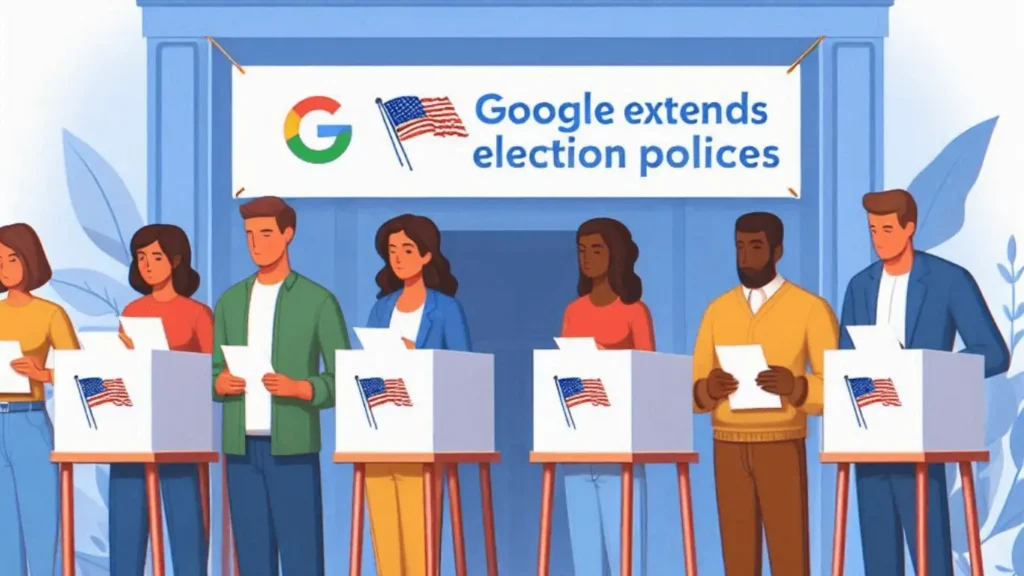Google Extends Election Policies: In a bid to bolster democratic integrity and ensure fair elections, Google has recently announced an extension and enhancement of its election policies. This significant move is part of Google’s ongoing commitment to prevent misinformation, protect user privacy, and promote accurate information during election cycles. Here’s a detailed look at what this extension entails, why it matters, and how it impacts users and the broader electoral landscape.
Table of Contents
Overview of Google’s Extended Election Policies
Google’s extended election policies are designed to address the evolving challenges associated with election-related content across its platforms. This includes Google Search, YouTube, Google News, and other related services. The updated policies aim to:
- Combat Misinformation
- Enhanced Content Review: Google will implement more rigorous content review mechanisms to identify and address false or misleading information related to elections.
- Fact-Checking Partnerships: The company will collaborate with independent fact-checkers to verify election-related claims and provide users with accurate information.
- Promote Transparency
- Political Ads Disclosure: There will be greater transparency regarding political advertisements, including clearer labels and disclosures about who is funding them.
- Source Attribution: Google will ensure that information sources are properly attributed, helping users identify reliable and trustworthy content.
- Protect User Privacy
- Data Protection Measures: Enhanced measures will be in place to protect user data from misuse, particularly concerning political targeting and ad personalization.
- Informed Consent: Users will have clearer options to manage their ad preferences and understand how their data is used in the context of political advertising.
- Prevent Election Interference
- Strict Policies on Foreign Influence: Google will enforce stricter policies to prevent foreign interference and disinformation campaigns aimed at influencing elections.
- Enhanced Reporting Mechanisms: Users will be provided with easier ways to report suspicious or harmful content related to elections.

Why Google is Extending its Election Policies
The extension of Google’s election policies comes in response to growing concerns about the role of digital platforms in shaping public opinion and influencing electoral processes. Key reasons for this extension include:
- Addressing the Spread of Misinformation
- Increased Risks: The proliferation of misinformation and fake news during elections can undermine public trust in the electoral process. By enhancing its policies, Google aims to mitigate these risks and ensure that users receive accurate and reliable information.
- Ensuring Fair Political Advertising
- Transparency Issues: There have been concerns about the transparency of political ads and the potential for misuse of personal data. Google’s new policies aim to address these concerns by increasing transparency and providing users with more control over their ad experiences.
- Protecting Democratic Processes
- Election Integrity: By preventing foreign interference and protecting user privacy, Google seeks to uphold the integrity of democratic processes and ensure that elections are conducted fairly and without undue influence.
Impact on Users
The extended election policies will have several implications for users:
- Improved Access to Reliable Information
- Enhanced Information Quality: Users can expect to see more reliable and fact-checked information about elections, reducing the likelihood of encountering false or misleading content.
- Greater Transparency in Political Ads
- Clearer Ad Labels: Political ads will be more transparently labeled, providing users with clearer information about who is behind the ads and their funding sources.
- More Control Over Ad Preferences
- Data Management: Users will have better control over their ad preferences and how their data is used, allowing for a more informed and personalized ad experience.
- Easier Reporting of Problematic Content
- User Reporting Tools: Google’s extended policies will include improved tools for reporting misleading or harmful election-related content, empowering users to contribute to a safer online environment.
Impact on Advertisers and Political Campaigns
For advertisers and political campaigns, the extension of Google’s election policies brings both opportunities and challenges:
- Adhering to New Guidelines
- Compliance Requirements: Advertisers will need to comply with new guidelines regarding transparency and content accuracy. This may involve changes in how political ads are created and displayed.
- Increased Accountability
- Data and Transparency: Political campaigns will be held to higher standards of accountability, particularly in terms of data usage and ad transparency.
- Opportunity for Trust Building
- Building Credibility: Campaigns that adhere to the new policies can build credibility with voters by demonstrating a commitment to transparency and integrity.
Conclusion
Google’s extension of its election policies represents a crucial step toward ensuring a more transparent, accurate, and fair electoral process. By addressing misinformation, enhancing ad transparency, protecting user privacy, and preventing election interference, Google aims to support the democratic process and enhance user trust in digital platforms. As the landscape of digital communication continues to evolve, these policies will play a vital role in maintaining the integrity of elections and promoting informed and engaged citizenship.
